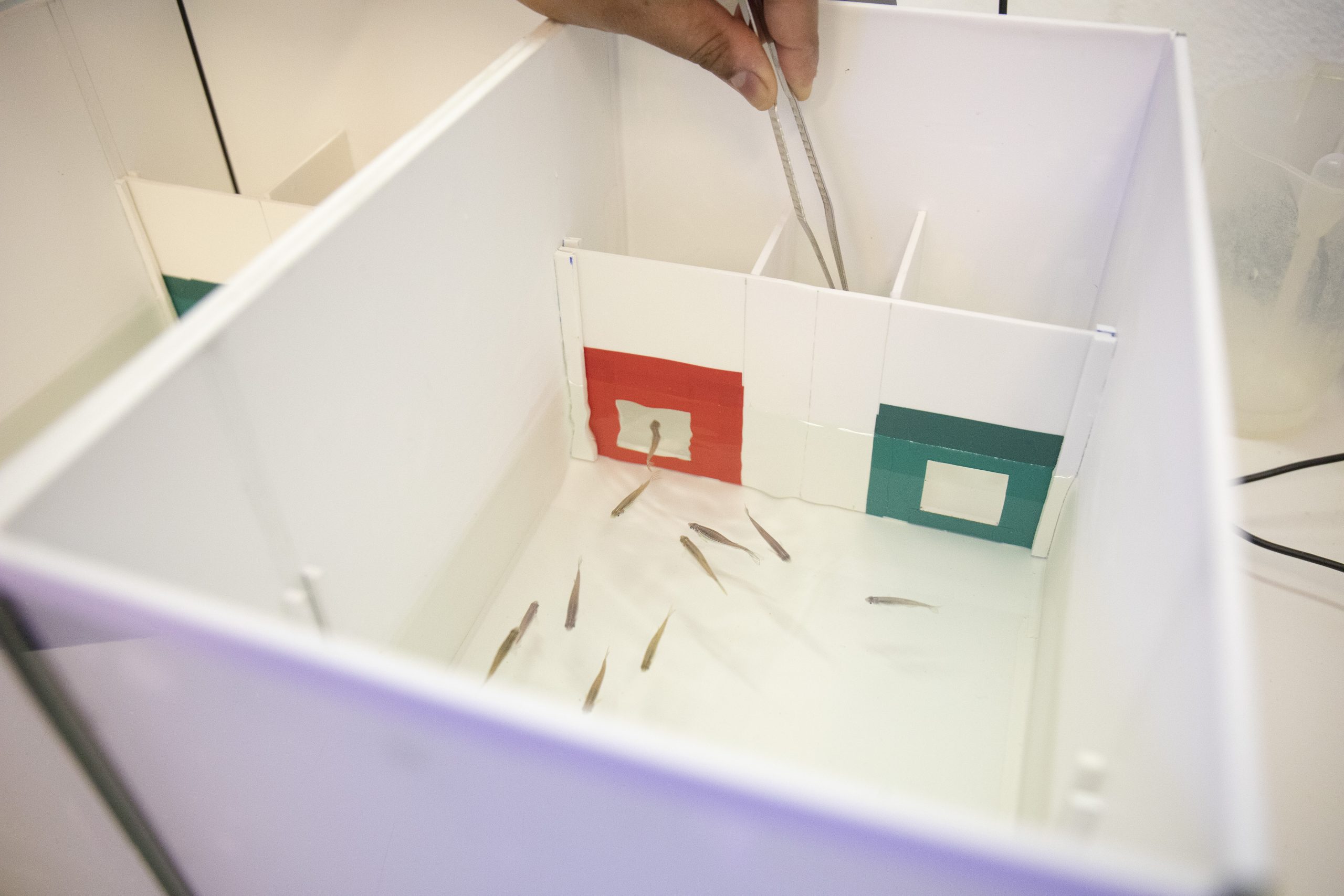Evolution of collective cognition in response to novel selection pressures – how individual-level adaptations shape group-level outcomes

©SCIoI
Animal populations are constantly exposed to novel selection pressures, including those exerted by humans in ecological systems. Darwinian selection is directed at individual phenotypes and underlying genotypes, ultimately leading to evolution. Through individual level evolutionary adaptations of energetics and the behavioural repertoire shown by individuals, the cognitive ability of individuals, and in consequence of groups, is expected to be altered in complex ways. Here, combining experiments with zebrafish (Danio rerio) populations evolutionarily adapted to size selection, agent based modeling and swarm robotic experiments, we aim at addressing three objectives: (1) understanding rapid adaptation of cognitive abilities to selection pressures targeting individual agents, (2) evaluating the consequences of adaptation of individual cognition at the collective level, and (3) examining the implications of altered collective intelligence on the fitness (individual and collective) towards natural versus human predators.
On the analytical side, hypotheses matching the above-stated three objectives will be tested using three selection lines of zebrafish as live models, while the synthetic research will illuminate the underlying mechanisms, generalize beyond the specific biological context, and allow us to investigate strategies for artificial swarms to quickly adapt to changing environmental pressures through pseudo-evolutionary replacement of individual agents or individual cognitive strategies. Last but not the least, we aim at a real-world swarm robotic proof-of-concept using the Thymio II platform.
Related Publications +
2756394
proj052
1
apa
50
creator
desc
year
20234
https://www.scienceofintelligence.de/wp-content/plugins/zotpress/
%7B%22status%22%3A%22success%22%2C%22updateneeded%22%3Afalse%2C%22instance%22%3Afalse%2C%22meta%22%3A%7B%22request_last%22%3A0%2C%22request_next%22%3A0%2C%22used_cache%22%3Atrue%7D%2C%22data%22%3A%5B%7B%22key%22%3A%22BVQ5CT3U%22%2C%22library%22%3A%7B%22id%22%3A2756394%7D%2C%22meta%22%3A%7B%22creatorSummary%22%3A%22Roy%20et%20al.%22%2C%22parsedDate%22%3A%222024%22%2C%22numChildren%22%3A1%7D%2C%22bib%22%3A%22%26lt%3Bdiv%20class%3D%26quot%3Bcsl-bib-body%26quot%3B%20style%3D%26quot%3Bline-height%3A%202%3B%20padding-left%3A%201em%3B%20text-indent%3A-1em%3B%26quot%3B%26gt%3B%5Cn%20%20%26lt%3Bdiv%20class%3D%26quot%3Bcsl-entry%26quot%3B%26gt%3BRoy%2C%20T.%2C%20Kotrschal%2C%20A.%2C%20%26amp%3B%20Arlinghaus%2C%20R.%20%282024%29.%20Evolutionary%20changes%20in%20cognition%20due%20to%20fisheries%20mortality%3F%20%26lt%3Bi%26gt%3BTrends%20in%20Ecology%20and%20Evolution%26lt%3B%5C%2Fi%26gt%3B%2C%20%26lt%3Bi%26gt%3B39%26lt%3B%5C%2Fi%26gt%3B%289%29%2C%20797%26%23x2013%3B799.%20%26lt%3Ba%20class%3D%26%23039%3Bzp-DOIURL%26%23039%3B%20href%3D%26%23039%3Bhttps%3A%5C%2F%5C%2Fdoi.org%5C%2F10.1016%5C%2Fj.tree.2024.07.007%26%23039%3B%26gt%3Bhttps%3A%5C%2F%5C%2Fdoi.org%5C%2F10.1016%5C%2Fj.tree.2024.07.007%26lt%3B%5C%2Fa%26gt%3B%26lt%3B%5C%2Fdiv%26gt%3B%5Cn%26lt%3B%5C%2Fdiv%26gt%3B%22%2C%22data%22%3A%7B%22itemType%22%3A%22journalArticle%22%2C%22title%22%3A%22Evolutionary%20changes%20in%20cognition%20due%20to%20fisheries%20mortality%3F%22%2C%22creators%22%3A%5B%7B%22creatorType%22%3A%22author%22%2C%22firstName%22%3A%22Tamal%22%2C%22lastName%22%3A%22Roy%22%7D%2C%7B%22creatorType%22%3A%22author%22%2C%22firstName%22%3A%22Alexander%22%2C%22lastName%22%3A%22Kotrschal%22%7D%2C%7B%22creatorType%22%3A%22author%22%2C%22firstName%22%3A%22Robert%22%2C%22lastName%22%3A%22Arlinghaus%22%7D%5D%2C%22abstractNote%22%3A%22%22%2C%22date%22%3A%222024%22%2C%22language%22%3A%22%22%2C%22DOI%22%3A%2210.1016%5C%2Fj.tree.2024.07.007%22%2C%22ISSN%22%3A%22%22%2C%22url%22%3A%22https%3A%5C%2F%5C%2Fwww.cell.com%5C%2Ftrends%5C%2Fecology-evolution%5C%2Ffulltext%5C%2FS0169-5347%2824%2900172-1%22%2C%22collections%22%3A%5B%5D%2C%22dateModified%22%3A%222025-09-26T13%3A16%3A18Z%22%7D%7D%5D%7D
Roy, T., Kotrschal, A., & Arlinghaus, R. (2024). Evolutionary changes in cognition due to fisheries mortality?
Trends in Ecology and Evolution,
39(9), 797–799.
https://doi.org/10.1016/j.tree.2024.07.007





